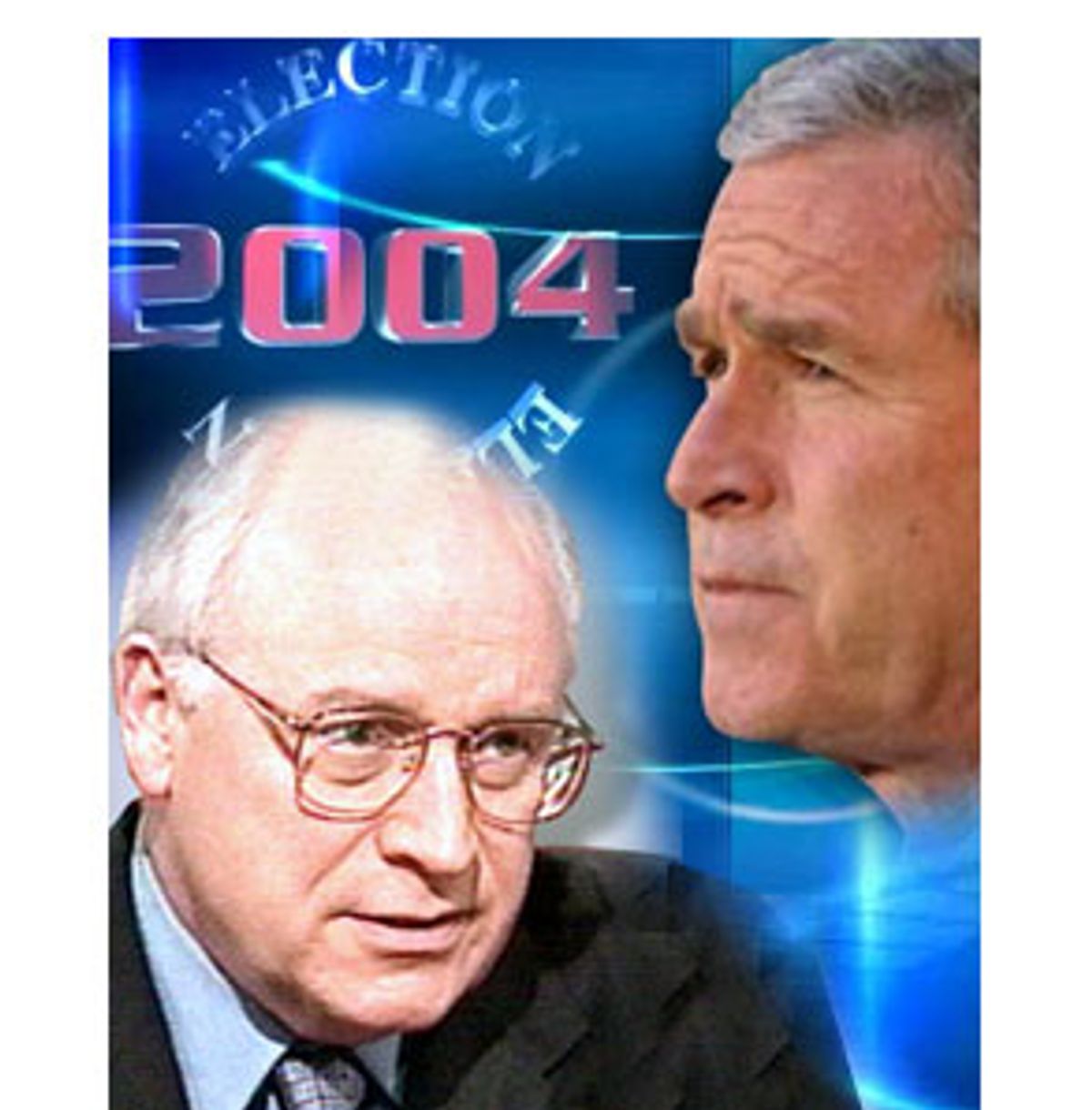Perhaps the most important divide in the presidential campaign is between fact and fiction. There are, of course, other sharp distinctions based on region and religiosity, guns and gays, abstinence and abortion. But were the election to be decided on domestic concerns alone George W. Bush would be nearly certain to join the ranks of one-term presidents, like his father after the aura of the Gulf War evaporated.
But one year after Bush's triumphant May Day landing in a flight suit on the deck of the USS Lincoln and appearance behind the White House-ordered sign "Mission Accomplished," his splendid little war has entered a Stalingrad-like phase of urban siege and house-to-house combat. By far, April has been the bloodiest month -- 122 U.S. soldiers killed, compared with 73 last April in the supposed last month of the war. The unending war has inspired among Bush's backers a rally-'round-the-flag effect, a redoubling of belief.
They believe in the cause as articulated by Vice President Dick Cheney this past week in his speech at Westminster College in Fulton, Mo., where Winston Churchill delivered his famous "Iron Curtain" oration. "You and I are living in such a time" of the "gravest of threats," said Cheney. Churchill stands as the model of leadership. "And today we have such a leader in President George W. Bush." Once again Cheney explains the motive for the Iraq war, implicitly conflating Saddam Hussein with al-Qaida and oblivious to the failure to discover WMD. "His regime cultivated ties to terror," he said, "and had built, possessed, and used weapons of mass destruction." And Saddam "would still be in power," he continued, coming to the point of his allegory, if John Kerry, cast as Neville Chamberlain, had had his way.
The misperceptions that Cheney was reinforcing are pillars of Bush's support, according to a study conducted by the University of Maryland. Fifty-seven percent of those polled "believe that before the war Iraq was providing substantial support to al Qaeda," and 45 percent "believe that evidence that Iraq was supporting al Qaeda has been found." Moreover, 65 percent believe that "experts" have confirmed that Iraq had WMD. "Among those who perceived experts as saying that Iraq had WMD, 72% said they would vote for Bush and 23% said they would vote for Kerry ... Among those who perceived experts as saying that Iraq had supported al Qaeda, 62% said they would vote for Bush and 36% said they would vote for Kerry." The reason given by respondents for their views was that they had heard these claims from the Bush administration.
These political pulp fictions are believed out of faith and fear. This is a classic case study in "the will to believe," as the American philosopher William James called it. The greater insecurity would be not to believe Bush. It would mean the president had misled or lied to us on national security. The Iraq war would not be pure, "either for us or for the terrorists," the good vs. evildoers, because the good cannot be false. Thus the idea of proof has shifted from fact to fervor that makes it so.
The attack lines against Kerry are that he is an opponent of national security and un-American. When Kerry committed the gaffe of uttering the truth that many world leaders secretly hope for his victory, he provided the Bush campaign with an opening. Secretary of Commerce Donald Evans has repeatedly said Kerry "looks French." Republican House Majority Leader Tom DeLay begins every speech: "As John Kerry would say, 'Bonjour.'" The Republican National Committee blasts out regular e-mails, "John Kerry: International Man of Mystery," charging that "Communist North Korea Is Only Government Supporting John Kerry," that he has a French cousin and, most damning, "British band Coldplay endorsed Kerry at Grammys."
The European mission this month of Sen. Joseph Biden, the ranking Democrat on the Foreign Relations Committee, is a telling if overlooked footnote to the campaign xenophobia. After meetings with French President Jacques Chirac and at Downing Street, he learned firsthand of the Bush administration's almost complete lack of consultation. Chirac offered first steps toward French assistance in Iraq, and Biden wrote a letter spelling them out to President Bush, who referred him to National Security Advisor Condoleezza Rice, who in turn politely listened and never responded.
Meanwhile, the Republican chairman of the committee, Sen. Richard Lugar, who has been granted exactly one meeting in the past year with the president, as though he were a foreign leader, remarked to negligible press notice: "The diplomacy is deficient. By that I simply mean not many people agree with us, or like us or are prepared to work with us. That will really have to change." "The only hope for real internationalization [in Iraq] is in regime change in the United States," a Senate source told me.
The brazen smears about Kerry's wounds and medals, his voting record on military programs as a senator and his loyalty have been communicated by the Bush-Cheney campaign through an unprecedented estimated $50 million in TV and radio advertising in fewer than 60 days in 17 swing states. This storm of unremitting negativity has bolstered the faith of Bush supporters tested by recent events and has managed to maintain the contest at a draw.
The attacks against Kerry have an internal logic consistent with the earlier falsehoods. They are a bodyguard of lies to protect the original ones that are the Praetorian Guard of Bush's presidency.

Shares